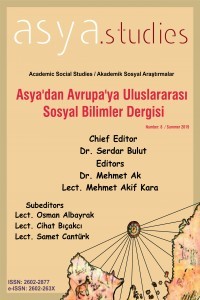
Asya Studies
Yazarlar: ["Mahmut ERKART"]
Konular:-
DOI:10.31455/asya.1222849
Anahtar Kelimeler:Geri Dönüşüm,Davranış,Planlanmış Davranış Teorisi,Ortaöğretim Öğrencileri.
Özet: The rapid consumption of the world's natural energy resources and the observable change in the climate with the increase of industries are among the problems that concern the whole world. In line with these developments, this research based on recycling is evaluated according to the Planned Behavior Theory. With the Planned Behavior Theory, it can be predicted to what extent a behavior will occur or not. Thanks to the Planned Behavior Theory, the purpose for the behavior can be measured and indirectly the probability of the occurrence of the said behavior can be determined. Recycling behavior is seen as an important part of a sustainable future, as it allows the protection of natural resources and the reduction of solid waste. Researchers have been investigating the variables that affect behavior for years and try to make sense of the emerging behaviors. By assessing the purpose of behavior, it attempts to uncover the hidden factors that make a person prone to act in certain ways. In Planned Behavior Theory, the purpose of behavior indicates whether an individual will exhibit a certain behavior. According to the theory, behaviors are the results of conscious decisions and this result is directed by the goals for the behavior. The aim of this research is to make an evaluation about the effect of planned behavior theory (attitude towards behavior, subjective norm, and perceived behavioral control) on the intention to return and the relationship between it in secondary school students in Turkey. Results; demonstrated that attitude, subjective norm, and perceived behavioral control were positively related to students' intention to recycle. As a result of the research, it was seen that secondary education institutions should design effective recycling campaigns to promote sustainability, and families should encourage children to recycle.